Hans Urs von Balthasar Collection (21 vols.)
Digital Logos Edition
Overview
Study the essential wisdom of one of the greatest theologians of the last century—Hans Urs von Balthasar. Writing over 100 books and articles, he was devoted to addressing spiritual and practical issues of his time and resisted reductionism and the human focus of modernity, wanting Christians to challenge modern and philosophical assumptions.
Hans Urs von Balthasar’s enduring significance
Hans Urs von Balthasar influenced the theology and studies of Raymund Schwager and Karl Barth. He is lauded equally by Catholics and Protestants for his theological works and his response to Western modernism.
Balthasar is best known for his 16-volume systematic theology which is divided into three parts: The Glory of the Lord, Theo-Drama, and Theo-Logic. The Glory of the Lord, the seven-volume work on theological aesthetics, introduces theology based on the contemplation of the good, beautiful, and true. The second part of the trilogy, the five-volume Theo-Drama, focuses on theodramatics, the actions of God and our human response. Balthasar particularly focuses on the events of Good Friday, Holy Saturday, and Easter Sunday. The trilogy is completed with the three-volume Theo-Logic. Here, Balthasar describes the relation of the nature of Jesus Christ (Christology) to reality itself (ontology). Finally, in Epilogue Balthasar brings together the three parts of his trilogy by providing an overview and analysis of the preceeding 15 volumes. This collection includes all four parts, as well as the four-volume Explorations in Theolgy, and Love Alone Is Credible.
The Explorations in Theology provide an excellent introduction to the thought of Balthasar for those unfamiliar with him, and their chapters will focus on specific themes treated throughout his works for those who are familiar with him. This collection is an excellent overview of the writings and thought of one of the most outstanding theologians of the past century. In Love Alone is Credible, Balthasar explores the manifestation of God’s love and reflects on the workings of that love through the Church.

- Unveils a thorough synopsis of Balthasar’s theological thought
- Links every cross-reference to the Church Fathers and to other works of Balthasar
- Presents practical and invigorating theological ideas
- Contains works that have been translated from German to English
- Title: Hans Urs von Balthasar Collection
- Author: Hans Urs von Balthasar
- Publisher: Ignatius Press
- Volumes: 21
- Pages: 9,453
- Christian Group: Roman Catholic
- Resource Type: Topical
- Topic: Theology
This title is included in the following collections
You can save when you purchase this product as part of a collection.
Hans Urs von Balthasar Collect...
$802.51$641.992025 Verbum Diamond Library
$2,999.99$2,099.99Modern Catholic Authors Bundle...
$2,499.99$2,499.992025 Verbum Portfolio Library
$4,749.99$3,324.99
- $3,999.99
- $4,749.99
- $23,999.99$17,999.99
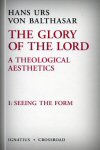
The work opens with a critical review of developments in Protestant and Catholic theology since the Reformation which have led to the steady neglect of aesthetics in Christian theology. From here, von Balthasar turns to the central theme of the volume: the question of theological knowledge. He re-examines the nature of Christian believing (here he quickly draws widely on such theological figures as Anselm, Pascal and Newman) which gives due place to the particular kind of ‘knowing’ which develops within the personal relationship to the believer to the God mediated through the revelation-form of Jesus Christ.
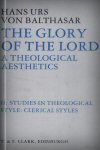
Henri de Lubac has described von Balthasar as “probably the most cultured man in Europe”. In this volume von Balthasar shows the extraordinary range of his knowledge and expertise in a series of essays designed to illustrate different ways in which theologians have shared their work. What he offers is “a typology of the relationship between beauty and revelation” which shows “that there neither has been nor could be any true great and historically fruitful theology which was not expressly conceived and born under the constellation of beauty and grace”. The volume offers a series of studies of representative figures from the earlier period of Christian theology, including Irenaeus, Augustine, Denys, Anselm, and Bonventura.
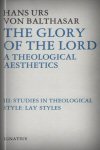
In this volume von Balthasar turns to the works of the lay theologians, the poets and the philosopher theologians who have kept alive the grand tradition of Christian theology in writings formally very different from the works of the Fathers and the great scholastics. This volume contains studies of Dante, John of the Cross, Pascal, Hamann, Soloviev, Hopkins, and Peguy.
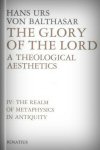
In this fourth volume of his magnum opus, von Balthasar considers the metaphysical tradition of the contemplation of being. He provides major studies of Homer, the Greek tragedians, Plato, and Plotinus and the development of this tradition in the Middle Ages. He then explores the analogy between the metaphysical vision of the being and the Christian vision of the divine glory of the Trinity. The book is a remarkable attempt to rediscover the ancient vision of being in all its awesomeness as the context within which the specifically Christian vision, rooted in God’s gracious self-revelation, took form and was expressed.
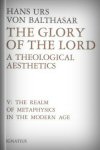
In this second volume on the metaphysical traditions of the West, von Balthasar presents a series of studies of representative mystics, theologians, philosophers, and poets and explores the three main streams of metaphysics which have developed since the ‘catastrophe’ of Nominalism. The way of self-abandonment to the divine glory is traced through figures like Eckhart, Julian of Norwich, Ignatius, de Sales; the attempt to relocate theology in a recovery of antiquity’s sense of being and beauty through figures like Nicholas of Cusa, Holderlin, Goethe, Heidegger; the metaphysics of spirit through Descartes, Leibniz, Spinoza, and the Idealists. The strengths and weaknesses of these ways are relentlessly exposed. The volume ends with the search for the Christian contribution to metaphysics.
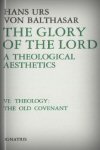
This volume initiates von Balthasar’s study of the biblical vision and understanding of God’s glory. Starting with the theophanies of the Patriarchal period, it shows how such glory is most fully expressed in the graciousness of the covenant relationship between God and Israel. But the breaking of that relationship by Israel means that in the later books of the Old Testament, the divine glory is seen in God’s willingness to bear with his people in the dark side of their history. There is no final version of God’s glory in the Old Testament. In the 500 years before Christ, the Covenant relation is more of an idea than reality. The vision of the transcendent glory of God which is developed in the later writings is only fragmentary. It will find its strange and unexpected fulfillment in the new Covenant.
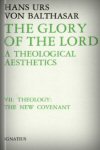
In this final volume of his great work, von Balthasar reflects on the New Testament vision of God’s revelation of his glory in Christ. This divine ‘appearing’ is grounded in the self-emptying of the eternal logos in the incarnation, cross, and descent into hell. Christ is the man who represents God and is also God; He is a symbol of the world and is also the world. He dies, but in dying rises into the eternal life of God. It is in Christ’s incarnation and resurrection that the Christian vision is truly expressed and the joining of God and the world in the new and eternal covenant is realized.
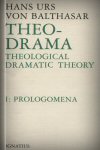
This is the introduction to the second part of the trilogy which is von Balthasar’s major work. The Glory of the Lord approaches revelation from the standpoint of the beautiful. The final part of the trilogy, the Theo-Logic, will treat Christian revelation from the standpoint of the true.
In this first volume von Balthasar shows how many of the trends of modern theology (e.g. “event”, “history”, “orthopraxy”, “dialogue”, “political theology”) point to an understanding of human and cosmic reality as a divine drama. He will then consider objections to such a theological dramatic theory and also the relationship between the Church and the theater. This volume assembles the materials and the themes that will make it possible in subsequent volumes to develop this theological dramatic theory.
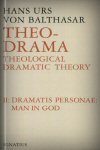
The first volume of this series surveyed the great world dramatists to gather concepts and ideas to apply to the real stage, which is the universe God has made and centered into himself as an actor. This volume describes the actors, the dramatis personae. This is his theological anthropology concerning man, his freedom and destiny in the light of biblical revelation. Von Balthasar is concerned here with the dramatic character of existence as a whole, approaching the topic through a consideration of the various conditions and situations of mankind as a drama that involves both the Creator and His creatures.
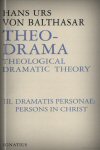
The third volume of Theo-Drama is considered the most central book of von Balthasar’s entire theological project. Structurally it is the middle volume of the middle part of his theological trilogy: Glory of the Lord, Theo-Drama, and Theo-Logic. More significantly, it contains von Balthasar’s synthetic treatment of the central mysteries of the Catholic Faith: Christ, Mary, the Church, man, and the Trinity.
The various elements of von Balthasar’s theological reflection converge here, and here as nowhere else one can find the systematic elaboration of his Christology, Mariology, ecclesiology, anthropology and Trinitarian doctrine. It is both a one-volume compendium of this theology and a key to his trilogy and other writings.
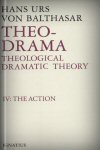
Having presented his Christology and Mariology under the sign of the "Dramatis Personae" in volume 3 of Theo-Drama, von Balthasar now turns to the action of the divine drama itself. Here we find his soteriology, where time, freedom, history, power, sin, conflict are seen in the light of the Cross, the culmination of the action and passion of God and man.
As Balthasar expresses it in the conclusion to his preface: here “we discern the unity of ‘glory’ and the ’dramatic’. God’s glory, as it appears in the world—supremely in Christ—is not something static that could be observed by a neutral investigator. It manifests itself only through the personal involvement whereby God himself comes forth to do battle and is both victor and vanquished. If this glory is to come within our range at all, an analogous initiative is called for on our part. Revelation is a battlefield. Those who do battle on it can only be believers and theologians, provided they have equipped themselves with the whole armor of God (Eph 6:11).”
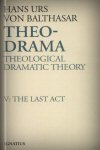
This is the final volume of this series on "theological dramatic theory" by the great 20th century theologian Balthasar. This series is the second part of Balthasar’s trilogy on the good, the beautiful, and the true which is his major work. The first series in the trilogy is The Glory of the Lord, and following this Theo-Drama series will be Theo-Logic.
In this series “the good” has been the focus. Balthasar maintains that it is in the theater that man attempts a kind of transcendence to observe and to judge his own truth about himself. He sees the phenomenon of theater as a source of fruitfulness for theological reflection on the cosmic drama that involves earth and heaven. This fifth volume is Trinitarian, focusing on the mystery of God. He draws heavily on Scripture and many passages from the works of the mystic Adrienne von Spyer. Some of the topics covered include “A Christian Eschatology”, “The World is from the Trinity”, “Earth moves Heavenward”, and “The Final Act: A Trinitarian Drama.”
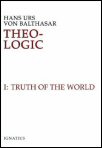
Theo-Logic is the third and crowning part of the great trilogy of the masterwork of theologian Hans Urs von Balthasar, following his first two parts, The Glory of the Lord and Theo-Drama. This third part of the trilogy focuses on theological “logic” and what role it plays in the event of God’s self-revelation through the Incarnation of the Logos and the outpouring of the Holy Spirit.
The Truth of the World searches to uncover the structures that characterize the truth of finite being, while keeping in mind that this truth cannot be explained outside of its circumincessive relation to the other transcendentals. This volume investigates truth as nature, freedom, mystery, and participation.
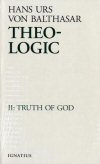
Truth of God concentrates on the truth that God has made known to us by his own initiative through free revelation, which therefore also becomes the ultimate norm of the truth of the world. This revelation, far from abrogating worldly truth, elevates and perfects it beyond itself. But the understanding, and description, of this relationship presupposes the analysis of the first volume.
While the first volume works with philosophical concepts from a philosophical point of view, the second follows a theological method from a theological point of view.
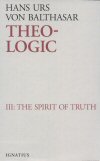
The final volume of the Theo-Logic focuses on the work of the Holy Spirit. Though Balthasar devotes some thought to the relations within the Trinity and to the problem of the filioque, he spends the better part of the volume presenting his ideas of the objective and subjective aspects of the Spirit’s person and work.
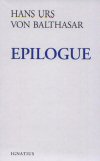
The great trilogy of theology by Hans Urs von Balthasar includes The Glory of the Lord, Theo-Drama, and Theo-Logic. His Epilogue, a single volume, is the closing of his masterwork, giving final details and overview to the prior volumes in the trilogy.
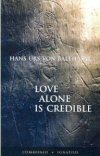
In Hans Urs von Balthasar’s masterwork, The Glory of the Lord, the great theologian used the term “theological aesthetic” to describe what he believed to the most accurate method of interpreting the concept of divine love, as opposed to approaches founded on historical or scientific grounds. In this newly translated book, Balthasar delves deeper into this exploration of what love means, what makes the divine love of God, and how we must become lovers of God in the footsteps of saints like Francis de Sales, John of the Cross, and Thérèse of Lisieux.
Based in the theological aesthetic form, Love Alone is Credible brings a fresh perspective on an oft-explored subject. This is nothing less than a deeply insightful and profound theological meditation that serves to both deepen and inform the faith of the believer.
Balthasar is becoming recognized as perhaps the greatest theologian of the 20th century—yet he never held an academic position in theology. . . . For Balthasar, things that exist don’t just lay there in existence; they glow from their participation in absolute Being. In Beauty, one is taken in and grasped by Being. In order to perceive a particular being as it is, one must surrender, be receptive, and be willing to be taken in by the form. Control or manipulation on the part of the beholder derails the aesthetical encounter. To share in the beauty, the viewer must renounce himself.
—Monsignor John R. Cihak, priest, Archdiocese, Portland
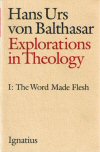
The first of four volumes of Balthasar’s many essays and conferences. Each focuses on a specific aspect of theology or spirituality and presents it with all the richness which comes from his immense erudition, but in a style that is directed and intelligible since few of these essays were intended for scholarly audiences.
Hans Urs von Balthasar was a theologian who placed his research at the service of the Church, because he was convinced that theology could be defined only in terms of ecclesiality. Theology, as he conceived of it, must be joined with spirituality; indeed, only in this way could it be profound and effective. . . . These are words that prompt us to reconsider the true position of research in theology. The demand for scientific method is not explorations theology sacrificed when theological research is carried on in a religious spirit of listening to the Word of God, when it is alive with the life of the Church and shares in the strength of her Magisterium. Spirituality does not attenuate the work of scholarship, but rather supplies theological study with the correct method so that it can arrive at a coherent interpretation.
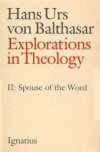
In this volume, Balthasar looks at the Church, “the Bride of Christ,” as both unspotted and unfaithful—the Church of saints and of sinners. He goes through Scripture and tradition looking at both sides of the Church and what they mean.
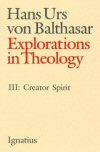
In this third book, Balthasar presents various ways in which something of the Creator Spirit should be experienced through his manifestations: in the way in which he leads human persons to the living God (“Faith”), in the way in which he distinguishes the spirits of this time (“Crisis”), in the way in which he initiates into the mystery of the Incarnate One (“Night”), in the way in which he breathes through the finite structures of human life as that which is incomprehensibly open (“Breath”), and in the way in which he reveals himself as love (“Spirit”).
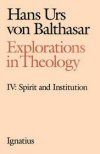
The fourth volume in Balthasar’s Explorations in Theology essays is built around the theme of spirit and institution, the two central features of the Church which Balthasar approaches from different angles. The first part of Spirit and Institution looks at who man is, and then examines the distinctively Christian experience of God. Part 2 is a whole section on the Church which includes topics like celibacy and the priesthood today, how we should love the Church, and understanding Christian mysticism. The third and final part is an eschatology in which Balthasar gives a brilliant summary of heaven, hell, and purgatory.
This concept of theology led von Balthasar to a profound existential reading. Accordingly, one of the central themes that he liked to dwell on was demonstrating the necessity of conversion. The change of heart was a central point for him; indeed, only in this way does the mind free itself from the limits that prevent it from drawing near to the mystery, enabling the eyes to fix their gaze upon the face of Christ. In a word, he had grasped profoundly the fact that theology can develop only with prayer that recollects the presence of God and relies upon him in obedience.
Hans Urs von Balthasar (1905–1988) was a Swiss theologian, considered to be one of the most important Catholic intellectuals and writers of the twentieth century. He studied in Vienna, Berlin, and Zurich, and completed his doctorate in German literature in 1928. Incredibly prolific and diverse, he wrote over one hundred books and hundreds of articles. Although the Balthasar’s studies are diverse and scattered, his theology and philosophies are stirring, practical, and profound. He was drawn towards the spiritual and mystical theology of the Church Fathers, deferring to Scripture and patristic writers to answer modernist and neo-scholastic questions. During his life, he was both a diocesan priest and a Jesuit instructor. He was nominated to be a cardinal of the Catholic Church by Pope John Paul II himself, but Balthasar died two days before his ceremony.
Reviews
0 ratings